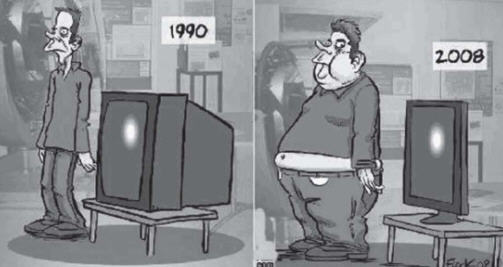One must reject superficial painkiller-like solutions
and seek out a permanent solution to all problems.
Continued from the previous issue . .
.
FROM SUPERFICIAL ATTEMPTS TO PERMANENT SOLUTION

I had a friend who would get recurring boils. His doctor gave him an ointment to heal the boils, but two days later another boil would surface on some other part of his body. Again he used the medicine and got relief for a couple of days. It didn’t take him long to realize he was actually miserable. So he tried another doctor. This doctor asked my friend to be patient the treatment would be painful at the beginning and then, as expected, there was a painful upsurge of boils all over his body. He screamed in agony but kept faith with his doctor and continued the treatment. Two weeks later, all the boils disappeared and he became healthy. He has never had boils since. The difference between the two doctors was that the first treated the symptoms the erupted boils themselves whereas the second addressed the root cause of his boils the impurities in my friend’s blood.
What’s the moral of the story? If we attempt to seek happiness by addressing the “boils” the symptoms of our miseries we will never become truly happy; we will only experience a fleeting relief from our distress. Later, sorrow will again strike us in some other aspect of our lives. If we address the root cause of unhappiness our real problems we can experience lasting happiness. Boils recur because of impure blood; suffering recurs because of our sinful tendency to break God’s laws. We need to lead our lives in congruence with nature and God’s laws. Doing so cures the impure blood in the consciousness.
In an attempt to be happy we try out a variety of pleasure-giving activities we go see a movie, drink, take drugs, or freak out. However, these activities may give us temporary relief from our day-to-day grind, but soon the cause of our distress bounces back into our awareness even more vigorously. If we address the real problems (please refer to the last article: “Search for Happiness, Part Four”), then we permanently cure distress. Unfortunately, modern society encourages us to seek temporary relief rather than address the real problems.
SEEKING HAPPINESS PAINKILLERS VS MEDICINES
Our present predicament can be compared to a heart patient who takes a painkiller to cure his chest pain instead of medicine to regulate the rhythm of his heart. A painkiller gives superficial relief from pain; real medicine, however, deals the disease from the root. The painkiller does have some advantages: it gives instant relief, it’s cheap, and it’s easily available. Disadvantages: it usually has miserable side effects, brings no permanent cure, and can often aggravate the original disease. The first time someone feels chest pain, the pain often goes away with a single pill. But when the pain returns, one pill is usually not enough a higher dose is needed. With each recurrence of pain, it generally takes more and more of the drug to relieve it. Eventually even six to seven painkillers can’t give us relief. Then one unfortunate day, a foolish patient may die of a heart attack despite swallowing a dozen painkillers. Painkillers aren’t bad they just aren’t a substitute for real medicine.
Movies, sex, liquor, drugs these are just a few things that provide instant relief to pressures of modern society. They may be effective, cheap, and easily available, but they are not a substitute for the real medicine a revival of our lost relationship with God. Temporary pleasures will eventually leave us disillusioned despite their promises. That explains why the rich and famous, despite unlimited opportunities to enjoy, commit suicide. Some years ago, Nafiza Joseph, the former Miss India, committed suicide with an overdose of sleeping pills. She had all kinds of pleasure at her disposal, yet her heart hankered for something else. We too may enjoy our senses unlimitedly yet still be miserable because of ignoring the real medicine of bhakti-rasa, the pleasure of devotional service to God. (Refer to the article “Search for Happiness, Part Two”.)
SMS THE THREE PAINKILLERS OF MODERN SOCIETY

Modern society has three broad categories of painkillers: sense gratification based on scientific advancement, mental speculation, and superficial religion. We’ve abbreviated these as SMS. The first category, sense gratification based on scientific advancement, or technology, provides us with instant relief and even more instant enjoyment but has also left human civilization disillusioned and unhappy. Over the last one hundred years science has made tremendous progress, with new and useful discoveries and inventions every year. Humankind has never had it so comfortable. Yet during the same one hundred years we have unprecedented poverty and human suffering.
We call scientifically based material advancement “a painkiller” because it provides temporary solutions to society’s problems but in the long run gives rise to further problems. For instance, the invention of the automobile solved the problem of having to commute by foot. We can now travel long distances comfortably and quickly. But now we have the problem of air pollution and global warming. Which problem the problem of having to walk everywhere or our inability to breathe the air is more serious? Today we are surrounded by luxuries air conditioners, iPods, laptops but we struggle to get basic necessities like fresh drinking water or clean air. We have acquired luxuries at the cost of necessities. Thus the solutions that modern scientific advancement provides leads to greater problems than the original one that were intended to be solved.
The external razzle-dazzle, the glamour of modernization, impresses us, and we tend to think we’d be happier leading a life centered on sense gratification.
We have painkillers to dull body pain, hair dye to hide our gray, facelifts to erase wrinkles. We have access to huge amounts of information, quick communication, and global connectivity. At the same time, we also have to deal with health issues, impersonal relationships, and online pornography. The invention of mobile phones has made us more efficient and enhanced the speed at which we can accomplish our work. However, we have lost our privacy. As a result, stress and heart disease are on rise. The Washington-based World Watch Institute, in a press release dated May 4, 1999, revealed that the twentieth century was the most violent century known in human history; three times more people died in wars during the twentieth century than during the entire history of warfare between 1 AD and 1899.
By the mental speculation category of “painkiller,” we are referring to self-help pep talks that promise happiness based on developing a positive attitude. The skills these self-help attempts provide have limited value because they do not address the real problems; rather they encourage us to seek solutions in this temporary world where the sevenfold problems constantly batter us. Books like You Can Win, Neuro Linguistic Programming, and meditation techniques are a few such painkillers that deny the realities of the world and tell us artificially to be positive.
Televangelism, too, is a painkiller that gives temporary relief through television channels like Astha attendance in professional spiritual discourses (Bhagavat-kathas), and performance of empty burdensome rituals. Watchers get some pious entertainment but do not realize the goal of life. Watching religious and spiritual programs on television can at best give us some mental peace, but they do not give us lasting solutions to the real issues burning our heart. People may even fight over rituals and claim the superiority of their path while the heart remains sad due to their not addressing the soul’s deep need to be connected to God through loving devotional service. Empty rituals do not satisfy the deep desires of the heart; they simply temporarily cover up our misery.
To be continued… “Returning Home the Permanent Solution for Happiness”
Vraja Vihari Dasa holds a master’s degree in International Finance and Management (MBA). He serves as a full-time resident devotee at ISKCON Mumbai and conducts seminars for students and the temple’s congregation members.
